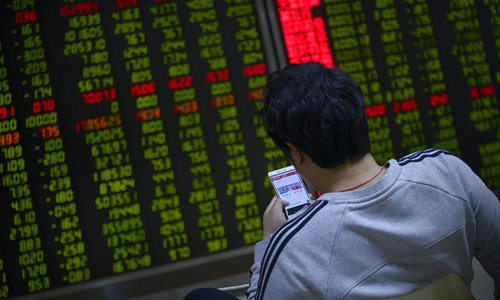HOME >> SOURCE
Mainland stocks unaffected by US-Iran tensions despite tumbling Asian markets
Source:Global Times Published: 2020/1/6 19:03:40

An investor looks at his smartphone showing results from the US presidential election at a securities company in Beijing on Wednesday. Stock markets around the world plunged in morning trading as incoming results from the US presidential election suggested Donald Trump was leading markets favourite Hillary Clinton in the White House race. Photo: AFP
A-share stock markets in the Chinese mainland were little changed on Monday, although worries over US-Iran tensions dragged down many Asian markets.The mainland stock markets moved "independently" among Asian stock markets, as A-shares' upward momentum is too strong to be interrupted by external factors like the US-Iran tensions, said securities expert Yang Delong, chief economist at the Shenzhen-based First Seafront Fund Management.
The benchmark Shanghai Composite Index was weaker at the opening and closed at 3,083.41 points, down 0.01 percent. But the Shenzhen Component Index edged up by 0.39 percent to 10,698.3 points, while the high-tech ChiNext board was up by 1.3 percent.
Heightened geopolitical tensions in the Middle East have sent prices of safe-haven assets like gold and oil flying, which in turn has driven up relevant stock sectors. On Monday, shares of China National Petroleum Corp rose by 4.71 percent to 6.23 yuan ($0.89).
New-energy vehicle shares also jumped in response to higher oil prices. In particular, Tesla-related companies, such as Tesla's mainland suppliers or business partners, saw gains as the US electric carmaker is poised to deliver the first batch of made-in-China Model 3 to mainland customers.
Most Asia-Pacific markets were caught in the heightened geopolitical tensions in the Middle East, after an Iranian military commander was killed in a US airstrike that raised concerns of retaliation from Iranian forces.
The KOSPI Index in South Korea fell 0.98 percent while Japan's benchmark Nikkei sank 1.91 percent. Hong Kong's Hang Seng Index edged down 0.79 percent to 28,226.19 points.
According to Yang, mainland markets are upbeat because of positive signs sent by the government that have bolstered confidence. For example, the central bank's reserve requirement ratio cut, which took effect on Monday, would release about 800 billion yuan of long-term capital into the markets.
The government's goal of transforming individual deposits into long-term capital in the markets would also boost A shares, according to Yang.
"China's golden property decade has ended with government controls on housing prices, and as capital shifts to stock markets, the golden era of equities will begin," Yang noted.